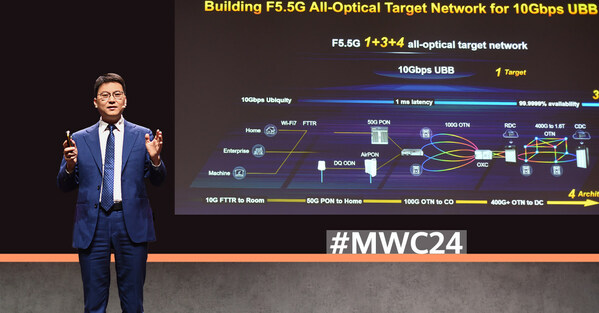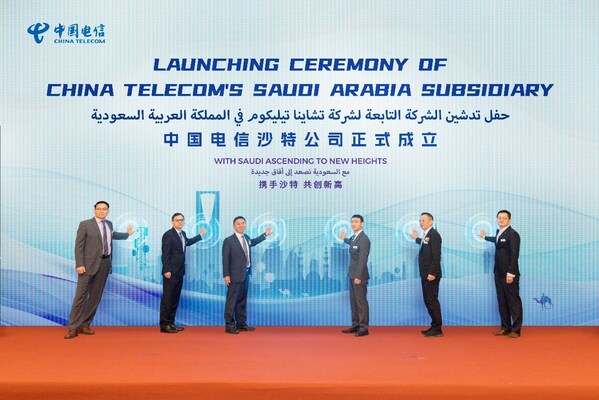BARCELONA, Spain, Feb. 27, 2024 /PRNewswire/ -- During MWC24 Barcelona at Huawei Product and Solution Launch, Bob Chen, President of Huawei Optical Business Product Line, launched the industry's first DC-oriented OTN product, OptiX OSN 9800 K36; the industry's first intelligent OLT product, OptiXaccess MA5800T; and the industry's first FTTR+X product, iFTTR OptiXstar F50 for ultra-broadband backbone, 10G access, and all-optical smart home scenarios. The three innovative products help operators build an F5.5G all-optical target network and accelerate development of 10G ultra broadband, together opening up the commercial use of F5.5G.
In November 2023, ETSI released the F5G Advanced Generation Definition. Huawei has worked with leading operators around the world to carry out F5.5G innovation and practice, with key F5.5G technologies and products including Wi-Fi 7, 50G PON, 400G, 800G backbone networks and OXC already in wide use. 10G connectivity is fundamental to the popularization of intelligent applications. Many countries and regions around the world have released 10G development plans and initiated the construction of 10Giga City. To boost further development of F5.5G, Bob Chen, President of Huawei Optical Business Product Line, noted that operators need to build an F5.5G all-optical target network that supports "1+3+4" core features amid 10G ultra broadband development. That is, centered around 1 network goal: 10Gbps ultra broadband; achieving 3 network capabilities: 10Gbps ubiquitous access, metro network reducing latency to 1ms, and backbone network achieving 99.9999% availability; building 4 network architecture: backbone network deploys 400G, 800G OTN to connect data centers, metro network requires 100G to COs, access network uses 50G PON to homes and enterprises, and connects 10Gbps to room.
To support the construction of the F5.5G all-optical target network with "1+3+4" architecture, Huawei has launched three innovative all-optical products.
Ultra-broadband backbone: Huawei has launched OptiX OSN 9800 K36, the industry's first DC-oriented OTN product. It has three innovations. First, it provides single-wavelength 1.6Tbps, 33% higher than the next highest rate — 1.2Tbps. It also reduces the per-bit cost by 30%. Second, it has an innovative dual-3D orthogonal architecture that doubles the number of supported slots, and delivers a single-subrack switching capacity of more than 100T, easily coping with traffic surges. Third, its built-in intelligent unit enables ms-level detection and real-time intelligent fault analysis, thereby improving network availability. 10G access: MA5800T, the industry's first intelligent OLT product, brings three upgrades. First, the capacity of a single slot on the device reaches 2T, more than twice the industry average, and can evolve to 200G PON. Moreover, it is compatible with existing GPON and 10G PON. Second, the product implements physical isolation for services through an innovative architecture, ensuring E2E deterministic latency and jitter for premium services. Third, its built-in intelligent computing unit improves user experiences in all aspects. All-optical smart home: iFTTR F50, the industry's first FTTR+X product, supports more functions besides network connection. It has three innovations. First, with a C-WAN architecture plus Wi-Fi 7, iFTTR F50 increases the access rate to 3000 Mbps. Second, based on accurate clock synchronization, it shortens the roaming handover time to 10ms and eliminates packet loss. Third, its built-in storage and computing unit provides users with a maximum of 8TB storage space and intelligent album search functions.Bob Chen, President of Huawei Optical Business Product Line, said, "2024 is the first year of F5.5G commercial use, and fixed networks will take a new leap forward. Amid the development of 10G ultra broadband, Huawei released three innovative all-optical products: DC-oriented OTN product OSN 9800 K36, intelligent 10G OLT product MA5800T, and FTTR+X product iFTTR OptiXstar F50, helping operators build the F5.5G all-optical target network with "1+3+4" core features, continuously broaden service boundaries, and advance the intelligent world."
 8 months ago
257
8 months ago
257 






 English (United States)
English (United States)